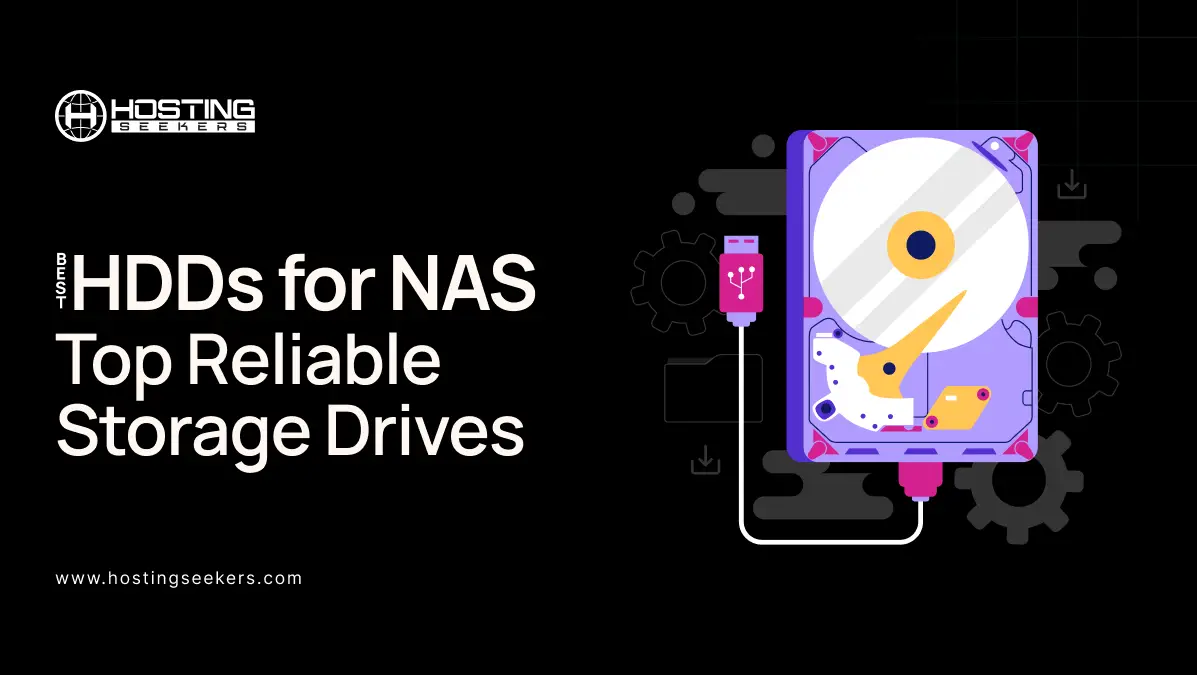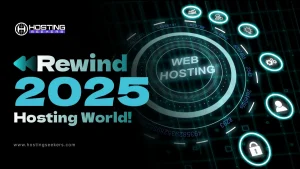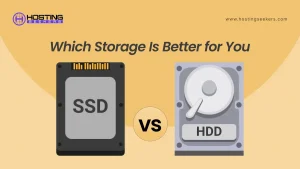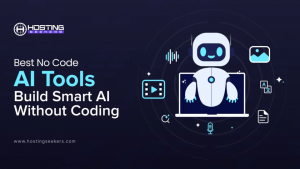
Best HDDs for NAS: Top Reliable Storage Drives in 2026
IT Updated on : December 31, 2025Whether you are operating a home media server, looking to manage a business backup solution, or wanting to stream 4k content, all NAS setups have one common denominator, which is the hard drive itself, and your hard drive can make all the difference.
In 2026, NAS storage remains the most reliable high-capacity storage solution for professionals and small businesses. While SSDs are ballooning in popularity, NAS-specific HDDs continue to be the most cost-effective storage solution, offering large storage capacity with 24/7 access.
What Is a NAS and Why You Need a NAS-Optimized HDD
A Network Attached Storage (NAS) is a dedicated device with data stored on it, which is accessible on the internet or a local network. Common usages of a NAS include file-sharing, media streaming, backups, and collaborative work.
NAS hard drives are specialized storage drives designed specifically for NAS systems, ensuring consistent performance, reliability, and compatibility in multi-drive environments.
Not all hard drives are made equal. A NAS-optimised HDD is tested for 24/7 use, has reduced vibration, better error recovery behaviour, and higher sustained workloads. Failure to use an appropriate HDD optimised for a NAS device may result in early HDD failure due to consistent workloads, more vibration in multi-HDD enclosures, and/or firmware issues.
Best HDDs for NAS in 2026
Below is a curated list of top NAS-suitable HDDs in 2026. These picks strike a balance of performance, endurance, and real-world usability.
1. Seagate IronWolf NAS
It’s designed for 24×7 reliability, performance, and scalability in a multi-bay NAS system. They feature AgileArray technology for optimised RAID performance, reduced vibration, and power efficiency with capacities up to 16TB.
IronWolf NAS drives deliver consistent speeds and durability under heavy workloads. It is built with CMR technology and RV sensors.
- Price: Starting from $679
- Capacity: 1TB – 16TB
- Ideal for: Home, small office, media servers
Pros:
- Built for 24/7 operation, supporting continuous use in networked storage systems.
- Features IronWolf Health Management (IHM) for proactive monitoring and enhanced reliability, making it great for setups that require uninterrupted data access.
- The system offers high performance and scalability, with CMR technology ensuring stable multi-user performance, especially in RAID configurations.
- Rescue Data Recovery Services (up to three years), providing peace of mind for data loss scenarios.
- Lower-tier models are cost-effective for home and small offices, while bigger capacities deliver enterprise-grade reliability.
Cons:
- Seagate IronWolf NAS drives produce noise when operating at full speed. There is a complaint about hearing clicking and beeping sounds during heavy use.
- Large capacity drives can consume significantly more power than smaller drives, which could affect overall power usage in a multi-drive NAS and may require a system with adequate power delivery.
2. Seagate IronWolf Pro (Best Overall NAS Drive)
IronWolf Pro drives are engineered for multi-bay, multi-user commercial and enterprise RAID storage solutions that provide performance, durability, and reliability 24/7. Total peace of mind with IronWolf Health Management, a 5-year limited warranty, and free 3-year Rescue Data Recovery Services.
- Price: Starting from $499
- Capacity: 2TB–30TB
- Ideal for: SMBs, Home servers, demanding collaborative storage
Pros:
- High workload rate (up to 550TB/year for larger models) and 2.5M hours MTBF, making it suitable for heavy-duty NAS setups.
- AgileArray firmware optimizes RAID performance and manages vibration, enhancing stability in multi-bay systems.
- Advanced technologies like HAMR for massive capacity (30TB) without compromising reliability or speed.
- Includes three-year Rescue Data Recovery Services plus a five-year warranty, ideal for business-critical data deployments.
- Rated as the best overall NAS drive in 2026 for balanced speed, endurance, and value.
Cons:
- It came to notice that the product is frequently returned by customers, and a high return rate indicates a potential pattern of issues.
- In smaller desktop NAS systems, noise can be a problem if placed in close proximity to the user, but for a larger server room there is nothing to be concerned about.
3. Western Digital Red: (WD Red Plus/WD Red Pro)
Western Digital’s Red Plus and Red Pro drives are designed for NAS environments, offering high reliability and performance under 24×7 workloads. Utilizing NASware technology, they are optimized for efficiency and reduced power consumption in multi-bay systems. With RAID-ready features and vibration protection, they are ideal for small businesses and power users.
- Price: starting from $269
- Capacity: Up to 12TB/14+TB
- Ideal for: Desktop NAS, large-bay home servers, SMBs
Pros:
- WD Red Plus and Pro provide multi-bay compatibility and good performance for mixed environments (SMBs and power users).
- WD Red Pro models (14TB+) use OptiNAND technology and offer up to 512MB cache for better handling of small I/O workloads.
- Five-year warranty on Red Pro, with strong spindle speed and caching for improved multi-drive performance.
- Red Plus prioritizes affordability, making it a great choice for users seeking reliable storage at a lower price.
Cons:
- The 5400 RPM drives in the Red Plus line are noticeably slower than the 7200 RPM Red Pro drives, especially in mixed file read/write tests.
- Higher power draw can lead to increased heat, potentially requiring better cooling solutions, particularly in a multi-drive NAS setup.
4. Toshiba N300
The Toshiba N300 is a high-capacity NAS hard drive suitable for personal, home office, and small business environments. It supports up to 8 drive bays, has capacities up to 20 TB, operates at 7200 RPM, and is designed for 24/7 reliability. It has a workload rating of 180 TB/year and a mean time to failure of 1.2 million hours.
- Price: Starting from $174.99+ (depends on TB)
- Capacity: Up to 20TB
- Ideal for: Medium to large NAS environments, small businesses
Pros:
- Recognized for good performance in RAID, high endurance, and excellent value for money in the mid-capacity range.
- Well-suited for users needing solid sequential speeds and reliability on a budget.
- Generally recommended as an alternative to Seagate IronWolf for 12TB and lower capacities.
Cons:
- The drive tends to run hot, sometimes requiring additional cooling, especially in poorly ventilated cases.
5. Synology HAT3310 Plus (Internal NAS HDD)
The Synology HAT3310 Plus Internal NAS HDD is a high-performance SATA HDD designed for small- and medium-sized business storage systems. It features up to 12TB storage, writing with a 1.2 million-hour MTBF (mean time before failure). Firmware and OS-level enhancements deliver up to 36% faster sequential read speeds compared to other drives in the same class.
- Price: Starting from $269
- Capacity: Up to 12TB
- Ideal for: Synology NAS units, integrated storage solutions
Pros:
- Specifically tuned for Synology’s own NAS systems, ensuring optimal compatibility and firmware support.
- Delivers balanced read/write speeds and reliability for home and small office environments.
Cons:
- The Synology HAT3310 Plus generally costs more than comparable-capacity drives from other manufacturers.
- Although it handles NAS workloads efficiently, its 7200 RPM speed is slower than that of modern SSDs and specific high-performance HDDs.
6. Exos X20 20TB Enterprise Drives
The Seagate Exos X20 20TB Enterprise Drive is a large-capacity and high-performance hard drive designed for enterprise storage applications like RAID arrays or data centers. With SATA 6Gb/s interface, it can support sustained data transfer rates up to 285 MB/s.
The drive has an MTBF of 2.5M hours, and the workload rating is 550 TB/year. The Exos X20 comes with a 5-year warranty and features PowerChoice and PowerBalance technologies.
- Price: Starting from $389
- Capacity: 20TB
- Ideal for: Enterprise NAS, data centers, large RAID arrays
Pros:
- Offers the highest yearly workload limit (up to 550TB/year), designed for extreme environments and heavy concurrent access.
- CMR technology for robust, reliable multi-bay performance.
- Known for unmatched uptime and stability within enterprise deployments.
- Five-year warranty and enterprise-grade firmware, making it suitable for mission-critical storage.
Cons:
- Certain Toshiba hard drives may have a warranty period starting from the manufacturing date, potentially reducing coverage time. To ensure full warranty benefits, it’s advised to register the product and verify the warranty status using proof of purchase.
Comparison Table – Best NAS HDDs 2026
Here is a side-by-side comparison to help you choose:
| HDD Model | Capacity Range | RPM / Interface | Warranty | Best For / Use Case |
| Seagate IronWolf | ~1TB–16TB | 7200/ SATA III 6 Gb/s | 3 years (with Rescue) | Home, small office, media servers |
| Seagate IronWolf Pro | ~2TB–30TB | 7200/ SATA III 6 Gb/s | 5 years | SMBs, Home servers, demanding collaborative storage |
| WD Red / Red Pro | ~2 TB – 12 / 14+TB | 5640 / 7200
SATA |
3 / 5 years | General NAS, mixed loads |
| Toshiba N300 | ~4 TB – 20 TB | 7200 RPM/ SATA 6 Gbit/s | 3 years | Heavy NAS workloads, video storage |
| Synology HAT3310 Plus | ~8 TB – 12 TB | 7200/ SATA 6 Gb/s | 3 years | Synology NAS ecosystems & features |
| Enterprise / EXOS | 18 TB – 20 TB | 7200/ SATA 6 Gb/s | 5 years | High-demand, data center, or heavy use |
Each drive above is optimized for specific NAS scenarios, from home and small offices to demanding enterprise and data center environments. Always check compatibility with the NAS brand before purchase and consider a balance of warranty, performance, and endurance for the best long-term results.
Factors to Consider Before Buying an HDD for NAS
| Factor | Why It Matters | Recommended Range / Notes |
| Workload / Duty Rating (TB/year) | NAS drives often handle continuous operation and parity rebuilds. | Look for drives rated at least 180–300 TB/yr for home use; pro/enterprise models go higher. |
| Vibration / Rotational Stability & Sensors | In a multi-bay NAS, drives influence each other. | Drives with rotational vibration (RV) sensors or multi-axis balancing are better. |
| MTBF / Reliability & Warranty | You want drives that last under stress. | 1 million hours MTBF or better, plus 3- to 5-year warranties (or more). |
| Cache & Firmware Features | A bigger cache and better firmware (e.g., error recovery tuning) help responsiveness. | 256 MB, 512 MB caches are common in higher-end models. |
| RPM (Speed) vs Heat / Power | More RPM gives better throughput, but more heat & power. | 5400 RPM is quiet & cooler; 7200 RPM gives better performance, especially in heavier use loads. |
| Recording Technology (CMR vs SMR / HAMR / PMR, etc.) | SMR drives can degrade performance under heavy random writes. | Prefer CMR (PMR) drives for NAS usage. |
| Brand & Ecosystem Support | Some NAS software vendors optimize or certify specific drive lines. | Use drives recognized/supported by your NAS vendor for best compatibility. |
| Availability & Cost per TB (GEO factor) | In India (or your local market), drives with local support and stock make sense. | Compare the effective cost per TB, including import, warranty, and service. |
By prioritizing reliability instead of busy HDDs based solely on speed, you can ensure that the NAS can be stable over the years.
Can You Use Normal HDDs for NAS?
The simple answer is yes, you can technically use standard desktop or external HDDs in a NAS, but that is not recommended except for very light, occasional use for the following reasons:
- Desktop drives often lack firmware tuning or optimization for protecting RAID. Desktop drives might take too long to recover from errors and get dropped from the RAID.
- Desktop drives are not designed for 24/7 availability and would be less reliable for constant operation.
- Desktop drives do not have added vibration compensation or sensors, which matters when they are being used next to other spinning drives.
- Desktop warranties may be different — drives that failed while operating in a NAS may not be covered by the desktop HDD warranty terms.
- Therefore, choose drives designed or certified for NAS workloads for optimal longevity and dependability.
Final Thoughts – Choosing the Best HDD for NAS in 2026
In 2026, the best hard drive for NAS will be reliability instead of peak speed. Customize the workload rating to meet your specific workload, but check first for required firmware or additional certification. Look for CMR, PMR, or HAMR types for better performance with random writes and RAID rebuilds. Consider the availability of local support, warranty, and stock on hand for service and replacement. When you have redundancy and backup enabled, you can prevent drive failure.
Frequently Asked Questions
Q1. Which hard disk is best for NAS?
Ans. The best depends on your needs; however, Seagate IronWolf (and Pro), WD Red/Red Pro, Toshiba N300, and Synology HAT have emerged as the leaders in 2026.
Q2. Are all NAS drives compatible with my NAS system?
Ans. Most NAS hard drives may not be universally compatible with all NAS systems. It’s advisable to verify compatibility through the manufacturer’s official lists or online tools. Factors like drive interface, physical size, and firmware can influence performance. Reviewing the manufacturer’s recommendations or contacting support before purchasing a NAS drive is recommended for optimal operation and warranty compliance.
Q3. How long do NAS hard drives last?
Ans. Under favorable conditions, a NAS hard disk can last 5-8 years or longer. However, many factors can change this (e.g., heat, vibration, workload). Monitor SMART data continuously and plan any replacement accordingly.
Q4. What is the difference between NAS HDD and external HDD?
Ans. NAS HDDs are built to run continuously under load, support multi-drive environments, are built with vibration in mind, and are intended for RAID. External HDDs are mostly desktop class and are optimized for no load with occasional usage spent enclosures.
Q5. Are NAS drives worth it for home users?
Ans. Yes, if the user runs a multi-bay NAS, is going to use it heavily, or wants a reliable solution. If the user is using it lightly (1 – 2 bays, occasional backup), using a premium desktop drive is fine; however, a NAS drive does provide better insurance over time.




